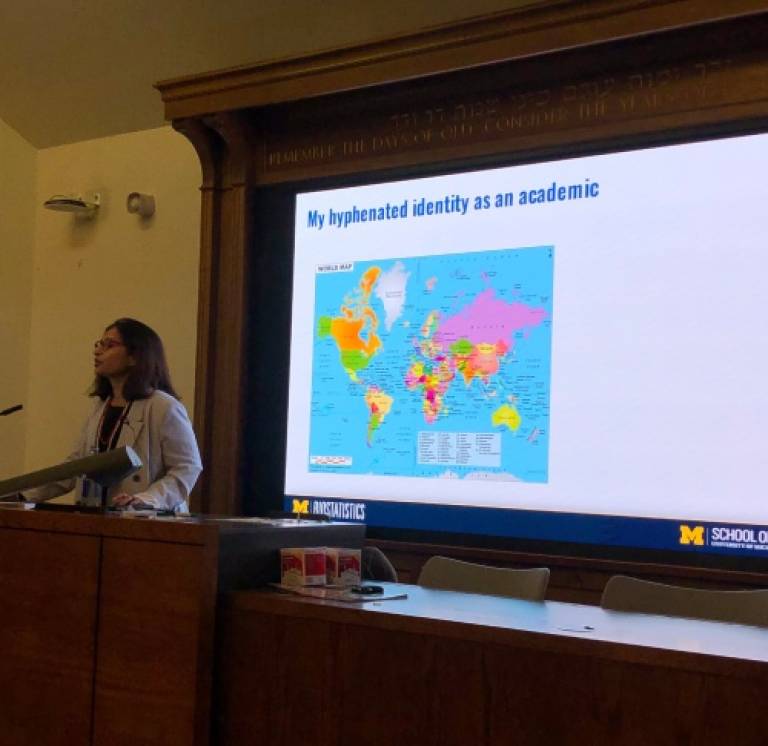Statistical Methods for Health Equity
27 November 2023
A one-day symposium held at UCL on 8 November 2023 examined the statistical innovations and methods that could be used to reduce health inequities.

A collaborative symposium focussing on Statistical Methods for Health Equity was recently held at UCL, bringing together UCL’s Institute for Mathematical and Statistical Sciences (IMSS) alongside Data Science for Health Equity (DSxHE). UCL's Departments of Mathematics and Statistical Science work together as constituent parts of UCL's IMSS, which aims to become London's leading centre for research, teaching and collaboration in mathematics and statistics. DSxHE is ‘a cross-sector community of academics, health and care professionals, policy-makers and enthusiasts advancing health equity through data science’.
The event was notably part of AI Fringe and the ESRC Festival of Social Science.
The importance of coming together for this event was explained by Dr Brieuc Lehmann (UCL Statistical Science), who organised the symposium:
“The factors underlying health inequalities are incredibly complex and intertwined – an interdisciplinary approach to investigating these is vital. Statistical methods have a key role to play in disentangling these factors to better understand inequalities using data, so it was wonderful to see such a diverse range of speakers and attendees from across the academic spectrum.
Keynote: The Data Struggle of the Unseen

Professor Bhramar Mukherjee (University of Michigan) delivered the symposium’s keynote, whose understanding of inequity is rooted in her personal and professional history. Professor Mukherjee's global view emphasised the need to address both social and environmental determinants of health which contribute to diseases, whilst striving for both data equity and health equity.
Research Talks
An afternoon of varied research talks included contributions by:
- Helen Blake (Applied Health Research) on Investigating Inequalities for Patients with Cancer
- David Shorthouse (UCL School of Pharmacy) on Uncovering Inequalities in the Reported Side Effects of Drug Formulations
- Rachel Burns (Institute of Health Informatics) on Assessment of the Healthcare and Hospital Admissions of Adult Non-EU Migrants and Refugees in England
- Catherine Bunting (UCL Great Ormond Institute of Child Health) on Evaluating the Effect of Health Visiting on Child and Maternal Health Outcomes: a target trial approach using administrative data
Workshop: Cascading Effects of Health Inequities in AI Systems
Antonella Perini and Ann Borda (The Alan Turing Institute) led an interactive session with attendees to demonstrate how technology and social structures both interact with and influence each other. The audience participated in an exploration of how biases can crop up in AI systems in 4 ways: through the design of the AI system itself, through data tasks, through external factors or ecosystems that influence the system or its outcomes, and through real-world patterns of bias.
Panel: Bridging the Gap: Translating data science research into actionable impact for more equitable health policy
The symposium closed with a panel chaired by Claire Coffey (University of Cambridge), welcoming Alisha Davies (Public Health Wales & Alan Turing Institute), Miqdad Asaria (London School of Economics) and Mai Stafford (Health Foundation). Each panellist offered insight on how we might overcome the varied challenges of translating data-driven insights into actionable health policy.
Watch the Recording
Watch the full recording of the symposium on YouTube:
Links
UCL Institute for Mathematical and Statistical Sciences
UCL Statistical Science
UCL Mathematics
DSxHE
Alan Turing Institute Health Equity Interest Group
 Close
Close

